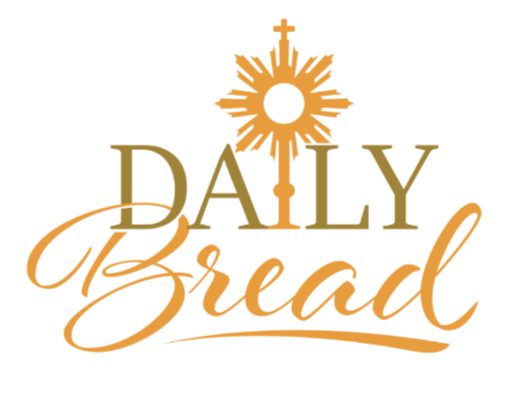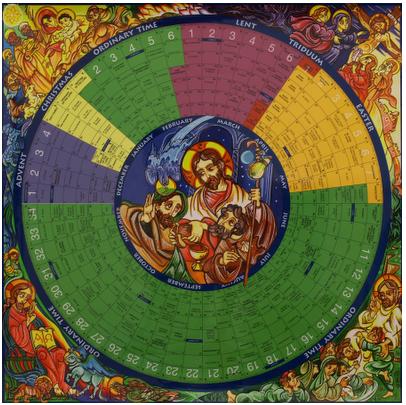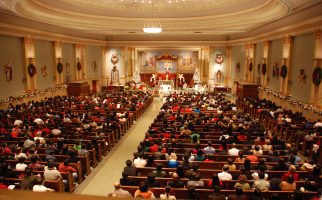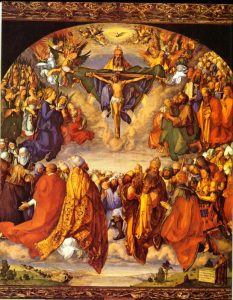What the Catechism of the Catholic Church Says
Holy days of obligation are explained in the Catechism of the Catholic Church in the following passage:
On Sundays and other holy days of obligation, the faithful are to refrain from engaging in work or activities that hinder the worship owed to God, the joy proper to the Lord's Day, the performance of the works of mercy, and the appropriate relaxation of mind and body.
Family needs or important social service can legitimately excuse from the obligation of Sunday rest.
The faithful should see to it that legitimate excuses do not lead to habits prejudicial to religion, family life, and health.
What are the Holy Days of Obligation?
The Catholic Church follows a liturgical calendar that marks feast days, solemnities and other special events. All of these days remind us of our spiritual journey as a church and celebrate the lives of extraordinary people that we should try to emulate like Jesus Christ and the saints.
As indicated in the Catechism of the Catholic Church, we are expected to attend Mass every Sunday. The Code of Canon Law describes Sunday in this way:
Sunday, on which by apostolic tradition the paschal mystery is celebrated, must be observed in the universal Church as the primordial holy day of obligation.
The canon also mentions 10 days that are to be observed as holy days of obligation. The following list shows these days in the order of the calendar:
January 1 | Solemnity of Mary, the Holy Mother of God |
January 6 | Solemnity of the Epiphany of the Lord |
March 19 | Solemnity of Saint Joseph, Spouse of the Blessed Virgin Mary |
Thursday of the sixth week of Eastertide | Solemnity of the Ascension of the Lord |
Thursday after Trinity Sunday | Solemnity of the Most Holy Body and Blood of Christ |
June 29 | Solemnity of Saints Peter and Paul, Apostles |
August 15 | Solemnity of the Assumption of the Blessed Virgin Mary |
November 1 | Solemnity of All Saints |
December 8 | Solemnity of the Immaculate Conception of the Blessed Virgin Mary |
December 25 | Solemnity of the Nativity of the Lord (Christmas) |
There are instances wherein holy days are moved to another date because they fall on the same date with another higher-ranking celebration. Even if this is the case, we are still expected to attend Mass on the holy day.
Working Holy Days
In some cases episcopal conferences may suppress holy days of obligation or move the date to a Sunday. However, some of them have maintained holy days that are not public holidays. In other words, they fall on work days and we may not be able to observe our obligation to “refrain from engaging in work or activities that hinder the worship owed to God, the joy proper to the Lord's Day, the performance of the works of mercy, and the appropriate relaxation of mind and body.”
These days are known as “working holy days” and we are still expected to attend Mass during this time. Some churches may hold specially scheduled Mass beyond regular working hours or in the previous evenings to accommodate the faithful who have activities on working holy days.
Holy Days of Obligation Around the World
Christmas Day (December 25) and the Immaculate Conception (December 8) are always considered holy days of obligation in the United States. In Ireland, only Christmas, the Solemnity of Mary Mother of God, Epiphany and All Saints’ Day are considered public holidays. Slovakia also has four days of obligation that are public holidays: Christmas, the Solemnity of Mary Mother of God, Epiphany and All Saints’ Day.
In the Netherlands, beginning January 1, 1991, the feasts of the Assumption and All Saints were considered holy days of obligation so the faithful are required to attend Mass but not abstain from work.
In Vatican City, but not the rest of the Diocese of Rome, Sundays and all the ten days listed in canon 1246 are observed as holy days of obligation. The Diocese of Lugano which includes the Swiss canton of Ticino, also follows this practice.
Significance of Holy Days of Obligation
Holy days of obligation are important to our faith because they encourage us to unite and celebrate significant events together as one church. God does not just love us as individual Christians, He sees us as one spiritual family that can support one another in our journey through life.
Second, we need to invest time in our relationship with our Heavenly Father and the holy days of obligation is one of the many ways that we can do this. Taking time to attend Mass demonstrates how much we prioritize God in our lives. Attending Mass lets us unite with Christ through the Eucharist and listen to His teachings.
Last but not the least, holy days are rooted on people and events that are significant to our religious history as a church. By observing and celebrating these holy days, we remember these people and events and we can reflect on their influence in our lives.



